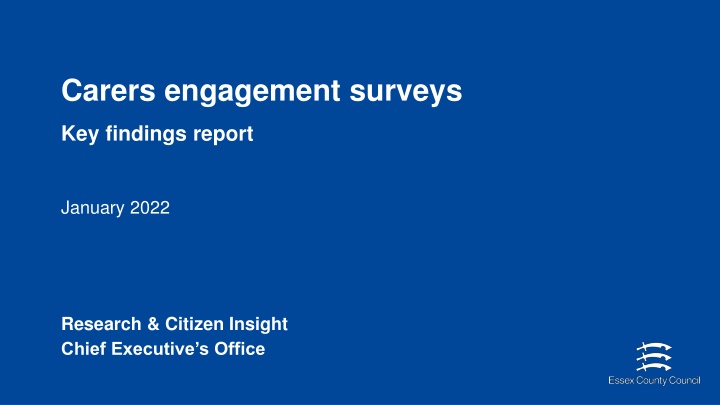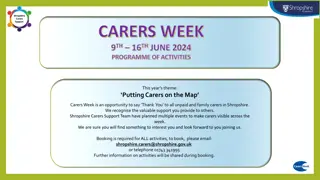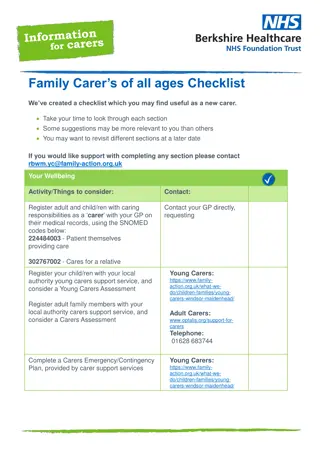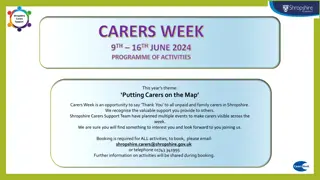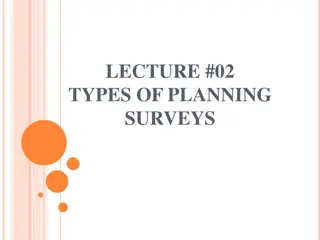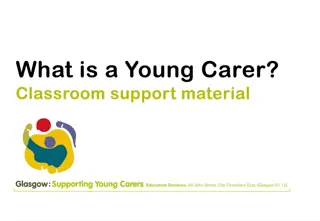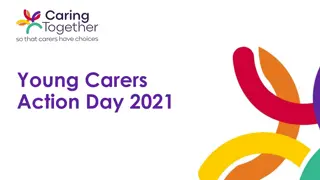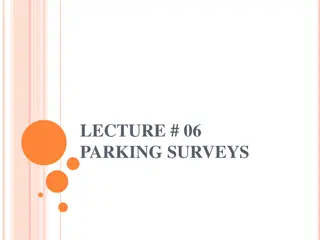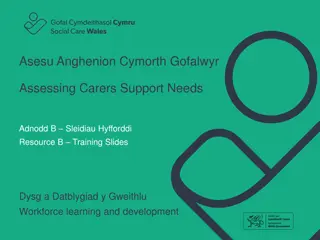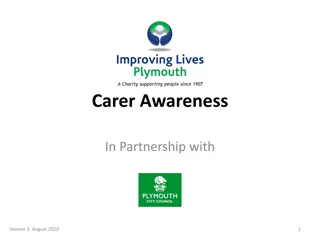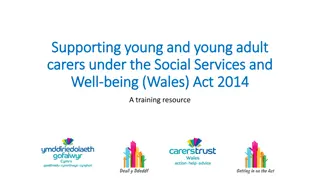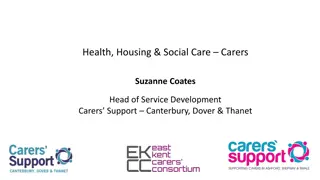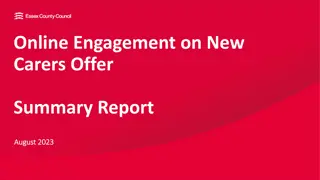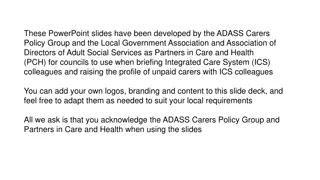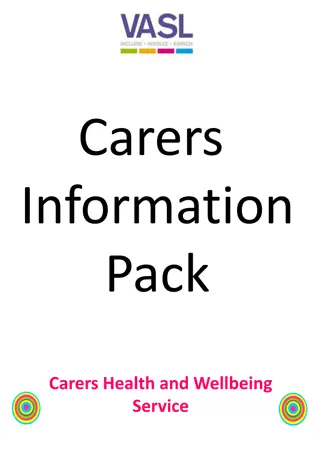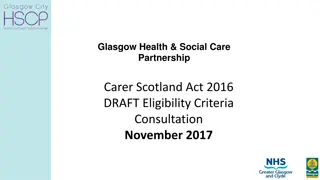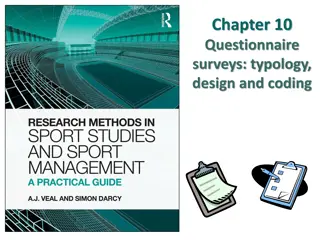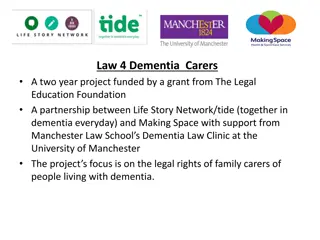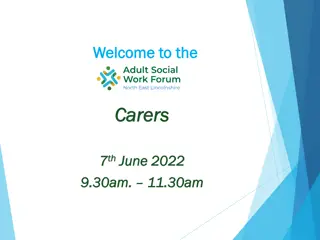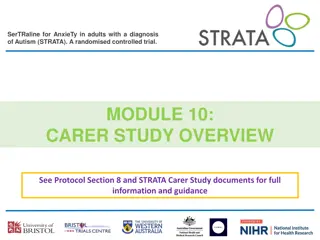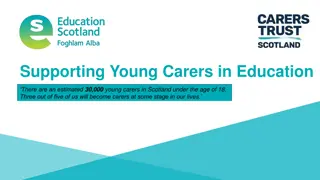Carers engagement surveys
During November-December 2021, Essex County Council conducted engagement surveys for adult and young carers in Essex to gather insights on their experiences and support needs. This report presents key findings from the surveys, including respondent demographics, carers' caring roles, and reasons for providing care. The data collected will inform the development of a new all-age carers strategy for Essex.
Download Presentation

Please find below an Image/Link to download the presentation.
The content on the website is provided AS IS for your information and personal use only. It may not be sold, licensed, or shared on other websites without obtaining consent from the author.If you encounter any issues during the download, it is possible that the publisher has removed the file from their server.
You are allowed to download the files provided on this website for personal or commercial use, subject to the condition that they are used lawfully. All files are the property of their respective owners.
The content on the website is provided AS IS for your information and personal use only. It may not be sold, licensed, or shared on other websites without obtaining consent from the author.
E N D
Presentation Transcript
Carers engagement surveys Key findings report January 2022 Research & Citizen Insight Chief Executive s Office
Background During November-December 2021 Essex County Council ran engagement surveys for both adult carers (18+) and young carers (aged 8-18) within Essex. The survey asked about experiences of caring for someone and what things carers feel are important to support them. Focus groups were also carried out with carers in a number of locations across Essex. The surveys were shared via carers organisations and providers, a range of voluntary and community groups across Essex, ECC s employee carer network, and social media platforms. Paper copies were also made available where needed. The young carers survey was also shared via Essex Youth Service and relevant networks. 388 responses were received for the adult s survey, and 72 for the young carers survey. Responses to both surveys are presented within this report. The surveys are likely to have reached those who are more engaged with organisations, therefore hidden carers or those not identifying as carers or accessing support may be underrepresented in this sample. A separate report is available for the findings from the focus groups, and all of the insight shared will be used to inform the development of a new all-age carers strategy for Essex which will be consulted on in early 2022. 15/02/2025 | 2 Produced by Essex County Council Chief Exec s Office
Adult carers survey Key findings
Survey respondents Three quarters of respondents were female. 76% female and 22% male. 2% did not disclose. 388responses were received in total. Age breakdown District breakdown Most of the respondents were from Tendring (18%) and Colchester (17%), followed by Chelmsford (13%). Nearly a quarter of respondents were aged 55-64, closely followed by those aged 45-54. Around a fifth were aged 65-74. Tendring 18% Colchester 17% Chelmsford 13% 55-64 24% Braintree 10% 45-54 23% Basildon 9% Maldon 5% 65-74 20% Harlow 4% 75-84 14% Rochford 4% 35-44 12% Castle Point 4% Uttlesford 4% Over 85 4% Epping Forest 4% 25-34 3% Brentwood 3% Prefer not to say 1% Southend 2% Other neighbouring county 1% 18-24 1% Thurrock 1% 0% 5% 10% 15% 20% 25% 30% 0% 2% 4% 6% 8% 10% 12% 14% 16% 18% 20% [Responses: 382] [Responses: 379] 15/02/2025 | 4 Produced by Essex County Council Chief Exec s Office
About caring role 24% of respondents are looking after more than one person. Who are you looking after? Why does the person(s) you look after need your support? The top reasons for needing care/support were dementia, long term health condition, and being elderly/frail. Comments under other include cancer, Parkinson s, stroke, and several other physical conditions. 45% are looking after their spouse/partner. 37% selected other family member around three quarters of comments stated carers were looking after their parents. Other comments referred to partners, siblings and grandparents. Dementia 40% Long term health condition 38% Spouse 45% Elderly/frail 37% Long term physical disability 28% Other family member 37% Mental health 25% Communication difficulties 17% Adult Son/Daughter 16% Autism 17% Chronic illness 15% Child 11% Neurological (not dementia) 15% Learning disability 15% Other (please specify) 3% Physical sensory impairment 10% Other (please specify) 5% Acquired brain injury Friend 4% 1% Disability after an accident 3% 0% 5% 10% 15% 20% 25% 30% 35% 40% 45% 50% Drug/alcohol issues 1% 0% 5% 10% 15% 20% 25% 30% 35% 40% 45% [Responses: 383] [Responses: 382] 15/02/2025 | 6 Produced by Essex County Council Chief Exec s Office
Accessing support Comments under other related to the following: Not accessing any support some mentioned being turned down by social care for support Support from charities and other local organisations Support from the health sector, including hospices and palliative care, and counselling services Formal support from paid carers Employee support forums Support from child s school (e.g. SENCO) Support from online groups/forums Where do you access support from, if any? Friends/family are where respondents are most likely to access support, followed by carers organisations and GPs. 13% said they do not know where to go for support. Family/friends 48% Carers organisations 35% GP 31% [Responses: 383] Time spent caring Adult social care 24% Community health services (i.e. pharmacy, district nurse) 20% 61% of respondents spend 50+ hours per week caring. 70% Other (please specify) 13% 61% 60% I don't know where to go for support 13% 50% 40% Neighbours 10% 30% Community groups 5% 20% 16% 11% 10% 10% 3% Children's social care 3% 0% [Responses: 368] up to 4 hours 5-19 hours 20-34 hours 35-49 hours 50+ hours 0% 10% 20% 30% 40% 50% 60% 15/02/2025 | 7 Produced by Essex County Council Chief Exec s Office
Impact of caring Comments under other related to the following themes: Has looking after someone meant that you have experienced any of the following in the past 12 months? The top responses were missed social events, reduced time for other family members, and reduced or stopped hobbies/clubs. Around half of all comments related to work, including a significant number who said they had to reduce or give up work, and many having to use annual leave for caring Many mentioned developing health issues of their own including mental health issues, lack of sleep, physical issues from caring, high blood pressure, and own health being generally neglected Many suggested they have no time to themselves, for socialising, being with their family or to do tasks of their own (e.g. housework, food shopping) Some mentioned disruptions to plans or things in their life requiring a lot of organisation due to their caring role Missed social events 84% Reduced time for other family members 72% Reduced or stopped hobbies/clubs 69% Reduced or stopped exercise 66% Missed other personal appointments (e.g. hair) 45% Missed own GP/health appointment 32% Been late for work 15% Other (please specify) 13% Called in sick to work 12% 0% 10% 20% 30% 40% 50% 60% 70% 80% 90% [Responses: 373] 15/02/2025 | 8 Produced by Essex County Council Chief Exec s Office
Challenges experienced What challenges have you faced looking after someone in the last 12 months, if any? The top challenges experienced were increased responsibility, time taken looking after someone, and no time to self. Comments under other related to the following themes: Own health challenges (both physical and mental health) Impact of Covid-19 health concerns, increased anxiety for those being cared for, inability to access services due to lockdowns, not being able to attend appointments with cared for Increased responsibility to manage life admin and time spent caring increased home workload which can be neglected Difficultyaccessing services/support including financial support if they do not meet eligibility criteria Impact on family relationships e.g. fall out with family who don t want to help, changed relationships with those they care for, concern for impact on other children Increased responsibility 84% More time taken looking after the person(s) 77% No time to myself 74% Loneliness/isolation 55% Feeling of guilt 52% Poor mental health 51% Poor physical health 41% Financial concerns 38% Impact on ability to work 36% Lack of support from services I am entitled to 34% Covid-19 restrictions impacting ability to care 27% Worrying about my personal safety 12% Lack of understanding from employers 7% Other (please specify) 4% 0% 10% 20% 30% 40% 50% 60% 70% 80% 90% [Responses: 382] 15/02/2025 | 9 Produced by Essex County Council Chief Exec s Office
Overcoming challenges Is there anything that has helped you to overcome these challenges? Comments received in response to this question mainly related to the following themes: Having people to talk to and the support of others (e.g. friends, family, peers) Support from organisations (e.g. Carers First, Crossroads, other voluntary sector groups) Formal support for the person they look after (e.g. paid carers for part of the week, help from support worker/ social worker, financial support) which allows them a much valued break/respite from caring Many suggested that nothing has helped and expressed that there is a lack of support generally Taking breaks from caring for hobbies and exercise, walking the dog and taking some time for yourself Having supportive and flexible employers to enable flexibility of hours, home working and time off when needed Being given the flexibility to take longer lunch breaks or come to work a bit later to attend medical appointment Being able to take odd days off at short notice to sort out any problems . Making sure I have a dedicated time to do things like have a bath, listen to music or exercise. Often I take my son with me as he benefits from this too . Crossroads provides me with some personal care for [husband] on 3 mornings. Bath, shower, dress and I have a 2 hour break on a Monday when he is taken out by his Crossroads carer for coffee and a drive . Accessing services provided by charities (MIND wellbeing sessions for my husband and Woolverstone Project sailing for the disabled) have given a few hours respite a week . 15/02/2025 | 10 Produced by Essex County Council Chief Exec s Office
Good things about caring role What are the elements of your caring role that you enjoy, if any? Comments received in response to this question mainly related to the following themes: Spending time with the person they look after increased quality time, bonding and growing closer Feeling reassured that the person is happy/looked after/well cared for some suggested caring for them in their own home was preferable to either someone they didn t know providing care, or the person having to go into a care home Many said there was nothing that they enjoyed, with comments stating that caring is hard work, stressful and upsetting, and many suggested that they do it out of duty or because they feel they have no choice Some expressed satisfaction with knowing they are providing a better quality of life and enabling the person to maintain some independence. For those caring for children/young adults in particular, they valued seeing them grow and develop. For those caring for their elderly parents, some felt it was a way of paying back or returning the love and care they had received from them when they were young. I enjoy being able to give my disabled 95 year old mother a safe loving place to be, where she is content. She is very grateful not to have been in a care home and cut off from family . Good to be able to give back some of the love and care received in the past. Reassuring to know that both parents are safe and well . The pride in seeing my daughter develop and achieve (at her own pace and in her own way) . None of it it is draining and has made me lose my identity. I haven't worked for four years and it is a struggle to feel independent and confident, no time for myself . I like being there for my mum and feel more comfortable about caring for her rather than other people doing so. But it's very tough and feels like we have no support . 15/02/2025 | 11 Produced by Essex County Council Chief Exec s Office
Carers views on the plan for carers areas of focus
Carers views To what extent do you agree or disagree that these are the right areas of focus for our plan for carers in Essex? The areas of focus which respondents most strongly agreed with were being involved in planning (86% agree/strongly agree), informing and educating the wider public (84% agree/strongly agree), and needs being identified and understood earlier (80% agree/strongly agree). Being directly involved in planning for those I am caring for 58% 28% 12% Informing and educating the wider public on carers/caring 53% 31% 12% My needs are identified and understood earlier 49% 31% 13% Improved carers assessment process 56% 21% 18% Alternative care & provision for the person I care for to help me/them have a break 54% 22% 19% Support to enable me to spend quality time with the person I care for 37% 35% 23% Practical information and support for me, e.g. planning, finances The area with the highest level of disagreement was around accessing similar training that is offered to paid carers (13% disagree/ strongly disagree). 38% 31% 26% For me to access similar training that is offered to paid carers 30% 24% 34% My employer understands and supports my needs as a carer 30% 16% 49% 0% 10% 20% 30% 40% 50% 60% 70% 80% 90% 100% Strongly agree Agree Neither agree nor disagree Disagree Strongly disagree [Responses: 385] 15/02/2025 | 13 Produced by Essex County Council Chief Exec s Office
Other comments The key themes under final comments related to improved information and support (particularly financial support and improved Carers Assessment process), being listened to/understood as a carer and the impacts of this (including improved understanding from professionals), being more involved in decision-making, and more respite needed. Improved support from employers, and more opportunities for peer support were also mentioned. Increased information and support needed, and improved experiences of support and assessments o Including earlier support, easier access to relevant information, better join up of services, improved communication with services and continuity of care many described a lack of support, no follow up, or constant chasing of services. It s extremely frustrating to have explain my situation over and over again to numerous social workers...I cannot tell you the hours and hours I have spent on the phone over the last 5 years Streamline the financial assessment. Better early intervention. It seems things have to be at breaking point before very little is done . I have been trying to get respite for my adult son for the past 4yrs, my son is 33yrs old and I have never had overnight respite for him I ve not had an assessment for 3yrs, I m 70 now and a single parent and need a break . Carers Assessment process is shocking. I work for a carers support organisation and some carers I support do not even realise they've had a Carers Assessment . More financial support required many commented that they are not entitled to financial support or that it is not sufficient to meet needs, particularly for those caring full-time to enable the person they care for to stay in their home. I strongly believe that any individual who is caring for a family member as their primary carer should be entitled to state or county financial support. I am doing the job of a paid carer but I'm entitled to no financial support at all; so in theory I'm a full time carer who takes over the responsibility of the state to provide care to my father but I do it for free . More sensitive tailored eligibility criteria is needed for welfare benefits relating to Alzheimer s does not always fit the set questions being asked on Attendance Allowance/Carers allowance form. Carers allowance payment amount is nowhere near enough to live on in order to be a full time carer . 15/02/2025 | 14 Produced by Essex County Council Chief Exec s Office
Other comments continued Being listened to and understood as a carer, being more involved in decisions about care and support, and more awareness and understanding from professionals. We need to be around the table with decision makers when they are deciding what support should look like for family carers and the family members we care for . I think services i.e. GPs and other services should understand far more about more severe mental health with lack of insight and the effect it has on the patient and the carer who looks after them . More respite/breaks needed for carers important to support own health and wellbeing and prevent deteriorating health, particularly for full-time carers. Respite is so so key to care long term for someone and be able to take self care seriously. I wasn t able and am now disabled due to poor health. It s been a long and stressful road of fighting for support in health social care and education and the benefits system. As a parent carer you spend most of your time emailing, phone calls or chasing professionals, it s exhausting . My life revolves around my son and his needs, when you manage a child for that many hours a day with no break or respite... believe me...there is no quality time due to exhaustion and mental health breakdown . Improved support and understanding from employers including greater flexibility and rights for carers. More rights for carers to take time off work or get paid leave and flexible hours. My last employer was not helpful in allowing me to take a slightly longer lunch break so I could check on my mum during the day...When I had to shield to protect her this was initially allowed but after 2 weeks I received a letter through my door saying I no longer had a job . More opportunities for peer support or local support groups to have someone to talk to. I feel it's very important for carers to have opportunities to meet and support each other. Whilst I'm lucky to have a network around me, many carers do not have this resource or are unwilling to 'burden' friends and family, but gain great benefit from meeting other carers, sharing experiences/strategies and support . 15/02/2025 | 15 Produced by Essex County Council Chief Exec s Office
Young carers survey Key findings
Survey respondents Majority of respondents were female. 59%female and 38%male. 2%other/did not disclose. 72responses were received in total. Age breakdown District breakdown Most of the respondents were from Harlow (21%) and Colchester (17%), followed by Basildon(14%). Majority of responders were either aged between 8-10 (43%) or 11-15 (43%). Harlow 21% Colchester 17% 11-13 43% Basildon 14% Uttlesford 11% Tendring 11% 8-10 43% Chelmsford 7% Other (please specify) 4% 16-18 7% Braintree 4% Rochford 3% Maldon 3% 14-15 7% Brentwood 3% Castle Point 1% Epping Forest 0% 0% 5% 10% 15% 20% 25% 30% 35% 40% 45% 0% 5% 10% 15% 20% 25% [Responses: 71] [Responses: 70] 15/02/2025 | 17 Produced by Essex County Council Chief Exec s Office
Survey respondents What type of school/college/work do you attend? Do you consider yourself to have a health condition, disability or impairment? Primary school 47% Most of the respondents are in education. 47% are in primary school, 43% in secondary school and 6% in college. Secondary school 43% Majority of respondents said they had no impairments (45%), with 18% ticking prefer not to say and 18% ticking autism spectrum disorder. Other conditions mentioned were ADHD, asthma and epilepsy. College 6% Not currently attending education 3% University 1% No impairment 45% [Responses: 72] 0% 10% 20% 30% 40% 50% Prefer not to say 18% Do you receive free school meals? Autism spectrum disorder 18% Mental health needs 12% Other (please specify) 9% Yes 47% Almost half of respondents receive free school meals (47%), while 43% do not and the remaining are unsure (10%). Learning difficulties/disabilities 8% Visual impairment/blind 2% No 43% Physical impairment 0% Deafblind 0% Don't know 10% Hearing impairment/deaf 0% 0% 10% 20% 30% 40% 50% 0% 10% 20% 30% 40% 50% [Responses: 71] [Responses: 65] 15/02/2025 | 18 Produced by Essex County Council Chief Exec s Office
Young carers experiences
About caring role Who are you looking after? Why does the person(s) need your support? Most of the young people care for people with mental health issues (44%), physical disability (39%) and long term health condition (32%). Those that ticked other specified Down s Syndrome, arthritis, FND, epilepsy, post-surgery care, ADHD, blood cell issues and dystonia. Most of the young carers are looking after their mum (63%), their brother (29%), followed by their dad (11%) and sister (11%). Others comments stated grandparents, husband and brothers. Mum 63% Brother 29% Dad 11% Sister 11% Other family member (please specify) Mental health 44% 6% Physical disability 39% 0% 50% Long term health condition [Responses: 70] 32% Autism 30% How much of your free time does your caring role take up? Learning disability 23% Physical health 21% Caring responsibilities took up a little bit (up to 4 hours per week) of free time for most respondents (41%), with 30% spending more than a little bit (5 to 10 hours per week) caring. Other (please specify) 11% A little bit (up to 4 hours per week) 41% Stroke 8% More than a little bit (5 to 10 hours per Blind 7% 30% Drug/alcohol issues 4% A lot (over 11 hours per week) 28% Deaf 1% None 1% 0% 10% 20% 30% 40% 50% [Responses: 71] [Responses: 71] 0% 10%20%30%40%50% 15/02/2025 | 20 Produced by Essex County Council Chief Exec s Office
Impact of caring Is there anything you find difficult about your caring role? Over half of the respondents said they find increased responsibility difficult (52%). Almost a third felt loneliness/isolation (32%) and/or sometimes felt guilty (32%). Increased responsibility 52% Loneliness/isolation 32% Sometimes feel guilty 32% Lack of understanding from friends 30% No time to myself 23% More time taken looking after the person(s) 23% Lack of support from other people 22% Nothing 19% Covid 19 impacting ability to care 17% Other (please specify) 6% 0% 10% 20% 30% 40% 50% 60% [Responses: 69] 15/02/2025 | 21 Produced by Essex County Council Chief Exec s Office
Impact of caring Has looking after someone meant that you have experienced any of the following in the past 12 months? Over two thirds of respondents reported being worried about cared for person during their school/college day (64%), while 47% stated that they missed out on social events and 44% experienced not being able to have friends around the home. Worried about cared for person during the school/college day 64% Missed social events e.g. friend's parties 47% Not being able to have friends around your home 44% Arrived late at school 40% Parents missing your activities/achievements 34% Reduced time with other family members 33% Reduced or stopped hobbies/clubs outside school 29% Not been able to complete homework on time 27% Not been able to go on holiday due to being a young carer 16% Not been able to attend after school clubs 10% None 7% Not been able to attend school/college trips for any reason 6% Not attended school/college due to caring role 4% Other (please specify) 1% 0% 10% 20% 30% 40% 50% 60% 70% [Responses: 70] 15/02/2025 | 22 Produced by Essex County Council Chief Exec s Office
Support [Responses: 53] Does anyone help you when you are struggling with your caring role? Tell us about what this help is and how it makes a difference to you. Comments to this question related to the following themes: Someone to listen and to talk to (e.g. friends, family, key worker, other young carers, counsellor) Support so they can have time for themselves (e.g. from neighbours, family, other carers, school) Activities from young carer groups to get a chance to be themselves Some stated that they don t receive help but would like some We have a club that runs every No one helps but it would make a big difference if they did. - Age: 16-18 Majority of respondents had support from their family to help cope with their caring role (77%), young carers worker (58%), followed by school or college (52%). Family 77% Young carers worker 58% 2 weeks for 2 hours on a Wednesday and its just some time for yourself whether that be you catch up on college work or just play some table tennis. However it can be hard to get to these meets due to college and placement times and travel. - Age: 16-18 School or College 52% Friends 32% Social worker 14% School have provided a medical card so if I'm feeling stressed out and overwhelmed I can be excused from class. - Age: 11-13 Youth club support worker 12% Counsellor 12% Neighbours 9% Other (please specify) 6% Since going to the youth club at cool Carers I ve met friends who are like me and understand how I feel with my commitments. - Age: 14-15 Family Solutions worker 6% Coming to the Young Carers group gives me a short time to have fun. - Age: 8-10 Doctor 5% 0% 20% 40% 60% 80% 100% [Responses: 66] 15/02/2025 | 23 Produced by Essex County Council Chief Exec s Office
Good things about caring role Is there anything you enjoy about your caring role? Comments received in response to this question mainly related to the following themes: Knowing that they are helping and spending time with the person they care for Time spent with the family and movie nights Having a support group Some stated that there was nothing they enjoyed about the role Learnt from the role and about the condition Influenced their career path I like helping with my brothers since my step dad left, being the man of the house makes me feel important but can be a struggle. - Age: 14-15 I like keeping mum safe and I do enjoy cool carers but no one does the things I do. - Age: 8-10 I like feeling like a grown up sometimes. - Age: 8-10 Giving love to my mum and brother by helping them. - Age: 14-15 I like helping my mum and spending time with her. I stay with her a lot. I have lots of medicine responsibilities and I know what she needs and when. - Age: 8-10 It has started my passion for my career I want to be a child s nurse. - Age: 16-18 I like it when people are proud of me for helping my mumma. - Age: 8-10 [Responses: 50] 15/02/2025 | 24 Produced by Essex County Council Chief Exec s Office
Support for young carers If you could have one thing to help you or support you as a young carer, what would it be? Comments received in response to this question mainly related to the following themes: Day and overnight trips, sports club, events/activities to have a break Help understanding the caring role Help and support for both the carer and the person being cared for e.g. with house chores Someone to talk to and who understands what it s like caring for a loved one No, I couldn t have asked for better support all round. - Age: not answered Someone to help my mum and someone to help me. - Age: 11-13 Having more time to do fun things with other children who help somebody at home. Also having someone to talk to like my young carers worker. - Age: 8-10 More funding for charity s such as young carers. - Age: 16-18 Someone who understands actually caring for someone you love. - Age: 11-13 More activities to meet other young carers and to have a break. Someone to talk to about being a young carer. - Age: 11-13 Being able to earn money without affecting money coming into the household. Making more people aware about it so you don't always feel pressured for not being able to do stuff. - Age: 16-18 I would like more fidget toys as it is mindfulness and that helps me . - Age: 8-10 [Responses: 49] 15/02/2025 | 25 Produced by Essex County Council Chief Exec s Office
This information is issued by: Essex County Council Research & Citizen Insight Sign up to Keep Me Posted email updates: Essex.gov.uk/keepmeposted Essex_CC Facebook.com/essexcountycouncil Contact us: research@essex.gov.uk The information contained in this document can be translated, and/or made available in alternative formats, on request. County Hall Market Road Chelmsford CM1 1QH Published on January 2022.
